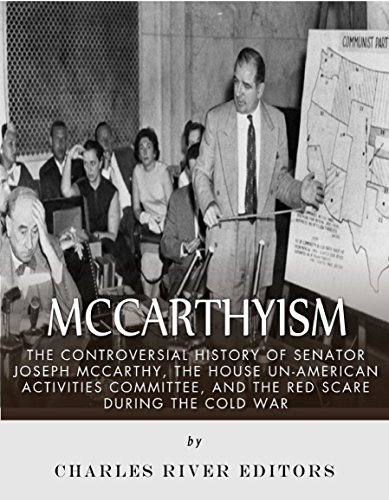
Word of the Day: Trumpery
Today’s word of the day, thanks to Wordsmith (“a worldwide online community of people who share a love for words, wordplay, language, and literature . . . founded in 1994 by Anu Garg” [https://wordsmith.org/awad/about.html]), is trumpery. The noun means “something showy but worthless,” “nonsense or rubbish,” or “deceit; fraud; trickery.” This may surprise some of you, but the word does not derive from the name of the current president of the USA. According to www.etymonline.com, the word first enters the English language in the “mid-15c., deceit, trickery,’ from Middle French tromperie (14c.), from tromper ‘to deceive,’ of uncertain origin (see trump (v.2), which has influenced the spelling in English). Meaning ‘showy but worthless finery’ is first recorded c. 1600.”
On this date in 1947, the House Committee on Un-American Activities began to investigate the prevalence of communism in Hollywood. This committee, part of the USA House of Representatives, was first established in 1938 “to investigate alleged disloyalty and rebel activities on the part of private citizens, public employees and organizations suspected of having Communist ties” (https://www.trumanlibrary.gov/education/presidential-inquiries/house-un-american-activities-committee), though it also looked at people who had Fascist sympathies. It was initially chaired by Howard Dies (D-TX), and at first it was not a standing committee. But in 1945 it became a standing committee.
In 1947, the HUAC (House UnAmerican Activities Committee), now under the chairmanship of Edward J. Hart (D-NJ), began investigating Hollywood. Eventually, some 300 actors, directors, producers, writers, and others would have their reputations and careers damaged because of the testimony before HUAC and the response of the studios. Most of the studios, meanwhile, starting making hyper-patriotic and anti-Communist films and documentaries to try to live down the reputation they’d gotten as hotbeds of communism.
In 1948, the committee began an investigation into allegations that Alger Hiss, a former government official, was secretly a Communist. The chief witness was Whitaker Chambers, a former member of the Communist Party and a senior editor at Time Magazine. Hiss denied the charge, but he was eventually found guilty of perjury (lying to an official agency) and spent time in prison. In the 1990s, after the fall of the Soviet Union, papers were discovered that proved that Hiss, for all his denials, was indeed a member of the Communist Party.
By the end of the Eisenhower administration, the HUAC had fallen into a kind of disrepute. Harry Truman, who was president during the committee’s investigations of both Hollywood and Hiss, denounced the committee as the most un-American thing in America. Part of the fall from grace was the committee’s associations with Joseph McCarthy, for whom is coined the word McCarthyism, “the practice of making accusations of disloyalty, especially of pro-Communist activity, in many instances unsupported by proof or based on slight, doubtful, or irrelevant evidence,” or more broadly, “the practice of making unfair allegations or using unfair investigative techniques, especially in order to restrict dissent or political criticism” (https://www.dictionary.com/browse/mccarthyism?s=t).
Joseph McCarthy claimed, in 1950, that he had a list of 57 (some claim 205, but he later wrote 57—nobody recorded the speech in West Virginia, so it’s hard to know precisely what he said) names of people in the US State Department who were working for the Soviet Union. The claim led to hearings of the Senate’s Tydings Committee, a subcommittee of the Senate Foreign Relations Committee, which investigated the loyalty of government officials. Millard Tydings (D-MD) believed that he could embarrass McCarthy, with whom the Democrats were angry for implicating members of Truman’s administration. One result of the clash of the two was, however, that Tydings was defeated in the November 1950 election.
McCarthy clearly used the claim of Communism to smear opponents who were probably not Communists. It was an effective approach. But the Democrats, and the media, vilified McCarthy for his tactic—indeed, the term McCarthyism was invented within month of his first accusations.
But here’s the thing: the Republic McCarthy used his government position to try to punish people who were avowed Communists, people who were antithetical to all that the USA stands for, and yet the HUAC is hardly remembered at all for doing the same thing. Nobody ever talks about Diesism or Hartism even though the leaders of the House committee were doing the same thing that McCarthy’s committee was doing, and doing it first. In fact, I would be willing to bet that most Americans, if presented with the names “House UnAmerican Actitivies Committee” and “Joseph McCarthy” would think that McCarthy was the person who headed up that committee, even though McCarthy never even served in the House of Representatives.
It’s important for us all to know our history. The real history of the HUAC and Joseph McCarthy reveals that both the Democrats and the Republicans in the USA unfairly punished people for their views, no matter how horrible the Communist ideology is. But somehow it is only one party that is remembered for having done so.
When we do not know the history, we risk becoming the victims of other people’s tricks. The deceit may come from con artists and criminals, but more often we will be deceived by politicians and journalists. They are the true experts in the art of trumpery.
The image today is the cover of a book published by Charles Rivers Editors. According to the author page on Amazon.com, “Charles River Editors is a digital publishing company that creates compelling, educational content. In addition to publishing original titles, we help clients create traditional and media-enhanced books.” No author for the book is listed. But it is clear from the cover and the title that we are expected to understand that Joseph McCarthy and the House UnAmerican Activities Committee are one and the same thing.